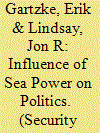|
|
|
Sort Order |
|
|
|
Items / Page
|
|
|
|
|
|
|
| Srl | Item |
| 1 |
ID:
175513


|
|
|
|
|
| Summary/Abstract |
Critics of the expansive US grand strategy of deep engagement argue that the United States should pursue strategies of retrenchment to avoid provoking conflicts with major powers and allied freeriding. Retrenchers believe the United States can rely on the inherent security its insularity and distance from other major powers provides and delay its possible interventions until strictly necessary. Should a hegemonic power emerge in Eurasia, its command of the maritime commons will allow US reentry into the region. This paper argues that such strategies are not likely to succeed for the US in Asia, but neither is the US likely to avoid escalation with China if it continues deep engagement. The balance of interests between the United States and its allies and adversaries is inherently asymmetric because the United States is a distant, offshore power. This in turn makes it difficult to convince adversaries and allies that it is willing to spend blood and treasure and to convince the domestic audience of the need to do so. Entanglement abroad and overselling at home are thus endemic in the US grand strategy. The history of US engagement in Cold War Europe illustrates how US commitments swung between the extremes of the pendulum. This paper shows how this dynamic applies to the Sino-American competition in the Western Pacific, where China seeks to raise the costs for the United States, and the United States seeks to maintain military-technological superiority to maintain access. If the United States is committed to upholding the balance of power, it must be willing to court disaster and treat China as an existential threat. In Asia, the former thus faces a stark choice between dangerous escalation and retreat.
|
|
|
|
|
|
|
|
|
|
|
|
|
|
|
|
| 2 |
ID:
175511


|
|
|
|
|
| Summary/Abstract |
Maritime disputes feature prominently in global politics, but we lack full understanding about how they arise and why they are militarized. China’s maritime conflicts with neighboring states (for example, Senkaku/Diaoyu, Spratly Islands) have generated over a dozen militarized clashes at sea since 1991. Confrontations in the Kerch Strait between Russia and Ukraine in November 2018 created similar concerns about the escalation of the situation to interstate war. Maritime diplomatic clashes are frequent; the Issue Correlates of War Project identifies 270 dyadic diplomatic claims over maritime areas globally from 1900 to 2010, with close to a third of these disagreements becoming militarized. This paper explores why countries experience diplomatic disagreements over maritime zones, why some maritime claims are militarized, and how countries can peacefully resolve these conflicts. The project is situated theoretically in the issue approach to world politics. Empirical analyses show that maritime areas with more salient resources (oil, fish stocks, minerals, etc.) and previous militarization become more violent on average. States with greater naval capabilities make more claims to offshore maritime areas and use more coercive strategies unless they face countries with similar naval strength. Unlike territorial disputes, maritime conflicts are more likely to occur between democratic, developed states and are more successfully settled through multilateral institutions. The findings show the conditions under which maritime claims may become a flashpoint for broader clashes at sea between major powers.
|
|
|
|
|
|
|
|
|
|
|
|
|
|
|
|
| 3 |
ID:
175512


|
|
|
|
|
| Summary/Abstract |
This paper explores the likelihood of maritime crisis stability between China and the United States by building on existing research on the Sino-American naval balance and the concepts of offense–defense theory. Whereas a “denialist” school in security studies argues that counterintervention technology makes defense dominant in the region, the US Navy remains a fleet designed for an offensive approach of power projection and sea control. Although this stubbornness in the face of a sophisticated anti-access capability might be attributable to a strong operational culture and obvious bureaucratic incentives, we posit additional forces suggesting defense dominance will not lead to crisis stability. At sea, offense–defense distinguishability is low and the temptation to strike first is high. Future interaction between current US and Chinese fleet designs risks a crisis or even war that will endanger the US fleet, potentially leading to the loss of the very military advantages underpinning American hegemony that its navy seeks to defend.
|
|
|
|
|
|
|
|
|
|
|
|
|
|
|
|
| 4 |
ID:
175510


|
|
|
|
|
| Summary/Abstract |
Students of world politics have long shown a special interest in sea power. International relations, however, tends to treat the means of power as homogeneous and interchangeable. Are military capabilities largely undifferentiated goods, or do specific assets matter for politics? We argue that the characteristics of naval power offer distinctive tradeoffs in terms of the causes of war. Naval presence, firepower, and mobility enable naval nations to fight farther from home and obtain more diplomatic recognition. At the same time, mobility and stealth introduce ambiguity about national priorities and contribute to errors in assessing the local balance of power and resolve. We find empirically that disproportionate investment in sea power is associated not only with heightened diplomatic recognition and power projection across greater distances, as navalists expect, but also with increased instability in the form of a higher risk of dispute initiation. Disaggregating sea power by platform type—battleships, submarines, aircraft carriers—suggests similar tradeoffs across platforms as for navies generally. Sea power enables political leaders to intervene in distant locales, where their interests are more peripheral, and to reconsider their commitments, where their interests do not justify the risk. One counterintuitive implication is that offshore balancing strategies, which rely on sea power for deterrence, may actually be destabilizing.
|
|
|
|
|
|
|
|
|
|
|
|
|
|
|
|
| 5 |
ID:
175514


|
|
|
|
|
| Summary/Abstract |
What options do great powers have to end future conflicts over limited political objectives without resorting to nuclear threats? This article examines a naval blockade as an option for militarized coercion that has been largely overlooked in existing scholarship on the conflict escalation ladder for great-power war in the nuclear era. Some US scholars have recommended a naval blockade of Chinese merchant shipping to coerce Beijing in a future war scenario. US leaders might select this blockade option because they believe it poses a lower risk of nuclear escalation than conventional strikes on the Chinese mainland and lower costs than directly engaging Chinese air and naval forces off China’s shores. Neither China nor the United States might be willing to risk nuclear war to achieve their limited political aims in future conflicts over Taiwan, North Korea, or disputed maritime territories. Existing literature has not sufficiently scrutinized the feasibility of a blockade and China’s military plans to respond to it, despite raising doubts about the effectiveness of a blockade to force a change in Chinese behavior. This article argues that an interception-style blockade at the Southeast Asian straits designed to minimize escalation risks is feasible. But the campaign would place severe demands on US naval forces and require extensive support from other countries. Chinese-language materials suggest China could respond militarily to that campaign with intentional escalation using nonnuclear weapons, which may be preferable to inadvertent nuclear use that could result from a US attack on the Chinese mainland.
|
|
|
|
|
|
|
|
|
|
|
|
|
|
|
|
| 6 |
ID:
175515


|
|
|
|
|
| Summary/Abstract |
Perhaps the most significant foreign policy decision facing the United States is whether to retain its global security commitments or retrench from key regions. Although primacists are optimistic that the United States will remain ahead of its rivals, restrainers are more pessimistic about its prospects. I argue instead that this debate overlooks the importance of geopolitical orientation. Maritime powers such as the United States are frequently in competition with multiple adversaries at once. This introduces an interdependent commitment problem that makes primacy difficult to sustain and dangerous to enforce, especially given the propensity to employ similar military approaches against different opponents. At the same time, maritime powers experiencing decline can respond in ways that fall short of retrenchment. This is mainly because their naval forces provide many options for upholding their obligations. Applied to the United States, these arguments suggest Washington might choose to diversify its defense strategy rather than abandon its commitments. In the Middle East, for example, it could rely on punishment via naval blockade rather than denial against Iran, not only because the former strategy would require fewer high-value military assets than the latter but also because it might allow the United States to avoid the types of clashes that would undermine its position relative to higher-priority threats.
|
|
|
|
|
|
|
|
|
|
|
|
|
|
|
|
| 7 |
ID:
175509


|
|
|
|
|
| Summary/Abstract |
For the first time since World War II the most likely friction points between a rising, potentially revisionist power and a declining, largely status-quo power are located at sea. This special issue accordingly seeks to set an appropriate agenda for security studies research. It presents six interconnected articles exploring different dimensions of maritime competition, largely between China and the United States. Between them, the articles employ three important approaches to security studies: quantitative analysis, pairing classic international relations theory with qualitative evidence, and operational-level research. Together, they consider different geographies—competition and conflict in the Western Pacific versus in the greater Middle East; different issue areas such contending legal claims and control over sea lines of communication; and, finally, different uses of naval power—including blockades, naval diplomacy, fleet engagements, and nuclear escalation. Combined, the issue encourages applying the many classic approaches of security studies to this high-stakes relationship while considering maritime conflict as distinct from other forms, such as land and nuclear, that have traditionally occupied the field.
|
|
|
|
|
|
|
|
|
|
|
|
|
|
|
|
|
|
|
|
|